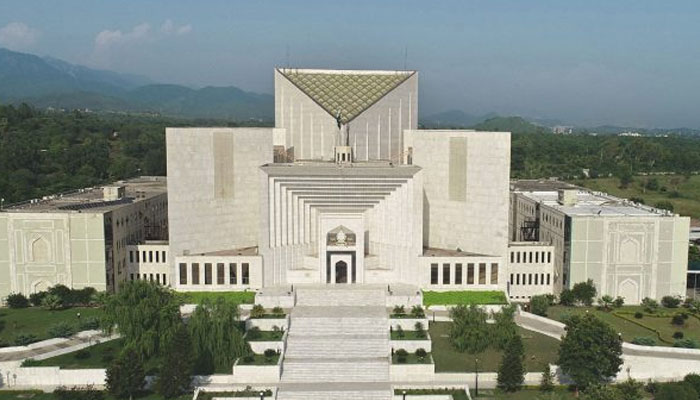No room for pre-arrest bail in law: Supreme Court
ISLAMABAD: The Supreme Court on Saturday observed that grant of bail to an accused wanted in a cognizable and non-bail offence prior to his arrest was an extraordinary judicial intervention in an ongoing or imminent investigative process.
A two-member bench of the apex court, comprising Justice Faisal Arab and Justice Qazi Muhammad Amin, declined the bail application of one Ghulam Farooq Channa, Secretary Union Council Jamshed Town, Karachi.
The judgment — authored by Justice Qazi Muhammad Amin Ahmed — held that grant of bail to an accused required in a cognizable and non-bail offence prior to his arrest was an extraordinary judicial intervention in an ongoing or imminent investigative process. “It logs the very mechanics of the State authority to investigate and prosecute violations of law designated as crimes,” says the judgment, adding that to prevent the arrest of an accused where it is so required by law is a measure with far reaching consequences that may include loss or disappearance of evidence.
The court noted that avoiding arrest since 28.8.2019 in the wake of dismissals, Ghulam Farooq Channa, Secretary Union Council Jamshed Town, Karachi sought bail in anticipation thereto; he was accused of having fabricated a fake death certificate of one Naseem Begum Chotani, on the basis whereof, his co-accused attempted to hoodwink judicial process to grab valuable properties vesting in the lady. Upon disclosure, the scam was reported to the Anti-Corruption Authorities and pursuant to an inquiry, the petitioner has been arraigned as accused alongside the accomplices.
The court further noted that the counsel for the petitioner contended that the alleged fabrication was reported after five years and in fact was committed by the officials at the higher rung and that the petitioner was being hounded as a scapegoat to save the real culprits; it was argued that the co-accused have since been set free on post arrest bail and, thus, petitioner’s remission into custody is not likely to serve any useful purpose, relative to investigation.
The court observed that the statute does not contemplate such a remedy and it was judicially advented way back in the year 1949 in the case of Hidayat Ullah Khan Vs. The Crown (PLD 1949 Lahore 21) with purposes sacrosanct and noble, essentially to provide judicial refuge to the innocent and the vulnerable from the rigors of abuse of process of law; to protect human dignity and honour from the humiliation of arrest intended for designs sinister and oblique. “The remedy oriented in equity cannot be invoked in every run of the mill criminal case, prima facie supported by material and evidence, constituting a non-bailable-cognizable offence, warranting arrest, an inherent attribute of the dynamics of Criminal Justice System with a deterrent impact; it is certainly not a substitute for post-arrest bail,” the court held.
The court observed that the petitioner was at the helm when the bogus certificate was issued; cognizance on belated disclosure does not mitigate the culpability nor can be equated with mala fide. “Release of co-accused on post arrest bails is entirely beside the mark for the reasons stated above”, the court ruled and held that the view taken by the learned High Court of Sindh as well as the learned Special Judge (Central-I) Karachi was in accord with the law, being consistently followed by this Court till date The petition fails and the leave declined”, the court concluded.
-
 ICE Agents 'fake Car Trouble' To Arrest Minnesota Man, Family Says
ICE Agents 'fake Car Trouble' To Arrest Minnesota Man, Family Says -
 Camila Mendes Reveals How She Prepared For Her Role In 'Idiotka'
Camila Mendes Reveals How She Prepared For Her Role In 'Idiotka' -
 China Confirms Visa-free Travel For UK, Canada Nationals
China Confirms Visa-free Travel For UK, Canada Nationals -
 Inside Sarah Ferguson, Andrew Windsor's Emotional Collapse After Epstein Fallout
Inside Sarah Ferguson, Andrew Windsor's Emotional Collapse After Epstein Fallout -
 Bad Bunny's Star Power Explodes Tourism Searches For His Hometown
Bad Bunny's Star Power Explodes Tourism Searches For His Hometown -
 Jennifer Aniston Gives Peek Into Love Life With Cryptic Snap Of Jim Curtis
Jennifer Aniston Gives Peek Into Love Life With Cryptic Snap Of Jim Curtis -
 Prince Harry Turns Diana Into Content: ‘It Would Have Appalled Her To Be Repackaged For Profit’
Prince Harry Turns Diana Into Content: ‘It Would Have Appalled Her To Be Repackaged For Profit’ -
 Prince William's Love For His Three Children Revealed During Family Crisis
Prince William's Love For His Three Children Revealed During Family Crisis -
 Murder Suspect Kills Himself After Woman Found Dead In Missouri
Murder Suspect Kills Himself After Woman Found Dead In Missouri -
 Sarah Ferguson's Plea To Jeffrey Epstein Exposed In New Files
Sarah Ferguson's Plea To Jeffrey Epstein Exposed In New Files -
 Prince William Prepares For War Against Prince Harry: Nothing Is Off The Table Not Legal Ways Or His Influence
Prince William Prepares For War Against Prince Harry: Nothing Is Off The Table Not Legal Ways Or His Influence -
 'How To Get Away With Murder' Star Karla Souza Is Still Friends With THIS Costar
'How To Get Away With Murder' Star Karla Souza Is Still Friends With THIS Costar -
 Pal Reveals Prince William’s ‘disorienting’ Turmoil Over Kate’s Cancer: ‘You Saw In His Eyes & The Way He Held Himself’
Pal Reveals Prince William’s ‘disorienting’ Turmoil Over Kate’s Cancer: ‘You Saw In His Eyes & The Way He Held Himself’ -
 Poll Reveals Majority Of Americans' Views On Bad Bunny
Poll Reveals Majority Of Americans' Views On Bad Bunny -
 Wiz Khalifa Thanks Aimee Aguilar For 'supporting Though Worst' After Dad's Death
Wiz Khalifa Thanks Aimee Aguilar For 'supporting Though Worst' After Dad's Death -
 Man Convicted After DNA Links Him To 20-year-old Rape Case
Man Convicted After DNA Links Him To 20-year-old Rape Case




